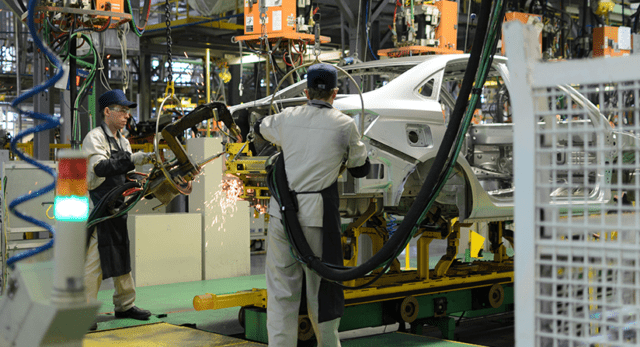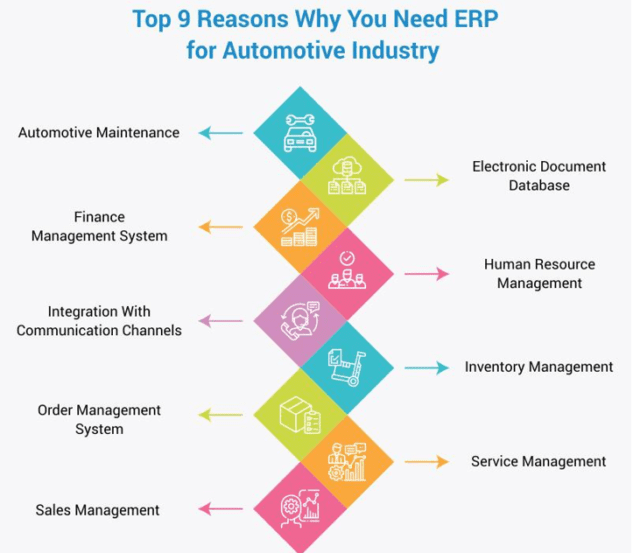Introduction

The auto industry is on the verge of a revolution. It plays a massive role in the global economy. As a dynamic and customer-driven industry, the automotive sector deals with components of different sizes and varieties that are required in varied workstations for assembling, polishing, and painting automobiles and their parts.
The global automotive industry will continue to grow for the foreseeable future. Manufacturers are faced with a growing demand for electric vehicles, autonomous vehicles, and connected mobility. A deep focus on customer satisfaction remains. Recalls and quality-related issues can negatively impact the original equipment manufacturers’ (OEMs) brand. As a result, the supply chain is under increased pressure to transform the organization while maintaining profitability, providing high-quality products, and delivering on time.
Where we once imagined an automotive factory focused on a digital, robot-driven production floor; reality has transcended the factory floor to include the entire manufacturing ecosystem—connecting employees, processes, machines, data, and customers—far beyond what was once envisioned for the automotive industry system. Modern Enterprise Resource Planning frameworks can help accomplish these objectives and by rethinking the organizational process.
Here are the top 9 reasons why you should use ERP for your automotive industry manufacturing business:

While factory workers, machines, processes, data, and other elements of production support automobile manufacturing factories, empowering transformative customer experiences is truly at the heart of the modern factory. The desire to adapt to quickly evolving demands is nothing new, except now technology trends such as industry-specific automotive industry software solutions are being adopted and integrated into ways that finally deliver on this real-time, customer-centric vision. Such industry-specific frameworks provide manufacturing organizations with a far-reaching set of elements that helps in tracking and analysing current policymaking, rolling out sensible improvements, and controlling departmental work.
When we talk about automotive industry software, ERP systems have added more value to organizations by optimizing operations, reducing costs, and maximizing profitability. From integrating value chain activities to maintaining warehouses, improving CRM, and real-time information access for enterprise visibility, ERP for the automotive industry helps you to reduce errors and make smart decisions.
ERP is a business process management software that allows automotive business owners to prudently manage their important auto parts, schedule, and plan workstations, and control the flow of BOMs.
So, let us take a look at why modern manufacturers are using ERP designed for the automotive industry –
-
Increased Real-time Data Access
Modern ERP systems allow users to streamline the information flow within an organization. It consolidates the data of every department and empowers decision-makers to make quick and informed decisions. Automotive industry manufacturers need up-to-date information on customers, resource availability, employee management, and manufacturing status. ERP provides this data. Manufacturers can view, edit, and manage this information in one solution.
-
Secured Data
Organizations create and maintain tons of content pieces – human resource policies, quality control reports, forms, business plans, barcode labels, batch numbers, routing reports, etc. From reports to customers’ data, an ERP helps you manage the end-to-end processes on a single system. When deployed on the cloud, data is safe and driven by automatically scheduled backups to prevent failure. Data security, updates, and storage are managed by the cloud provider.
-
Enhanced Inter-organizational Communication
ERP removes communication barriers between teams and departments. Every authorized person has access to view and edit data. With an ERP solution, management can have a view of the entire organization and activities going on in departments to include production, quality control, supply chain management, procurement, shipping, human relations, finance, warehouse, etc.
-
Greater Compliance
ERP developers understand the stringent quality standards the automotive industry requires. Smart ERP facilitates detailed labelling capabilities, AQL (Accepted Quality Level), and RQL (Rejected Quality Level) to ensure adherence to quality parameters. Automotive manufacturers can make prompt decisions by tracking sample frequencies, production defects, and viewing and executing the quality plan.
-
Inventory Optimization
Surplus inventory is an undesired expense while stock-outs can hamper customer needs. Automotive industry manufacturers need to carefully manage inventory and warehouse operations. Optimus ERP facilitates report generation, recording of warehouse transfers, capturing of inventory, and the processing of tasks and transactions on the plant floor.
-
Automation of Tasks
With electronically generated reports and sheets, you do not need to manually generate delivery notes and invoices, everything is done at the touch of a button. This saves money, time, and effort, and reduces errors.
-
Lower Costs and Higher ROI
When an ERP is hosted on the cloud, manufacturers do not need to have multiple servers or recruit a team of IT professionals for installing and configuring the systems. It is all done by the cloud providers. A modern ERP provides lowers costs and improves ROI with optimized production, greater visibility, increased efficiency, and improved customer satisfaction.
Quality and Customer Relations
Successful manufacturers employ an ERP solution with rich and powerful features that facilitates swift actions. The Quality Control module of Optimus ERP is devised seamlessly to enhance quality assurance processes and reports. It manages receiving, delivery inspections, bin management, quality control, and a Material Review Board so you can make quick decisions on quality issues. When quality standards are met and products are delivered on time, you achieve customer satisfaction.
-
Employee Efficiency
Happy employees work with greater efficiency. When using an ERP system, you can automate operations and eliminate data redundancy which helps improve employee satisfaction and efficiency. ERP also allows data to be accessed with handheld devices so employees can work remotely.
-
Optimization of Resources
An ERP solution drives lean manufacturing and helps businesses develop a lean supply chain that can ensure optimum utilization of resources, improved lead time, and less waste. When tasks are assigned to the person with the right skills, you receive the best outcome. ERP software allows you to match skills with machinery on the shop floor.
The major advantages of ERP for the automotive industry are summarized below
Enterprise Resource Planning is an agile and powerful business solution for automotive manufacturers that enables growth, productivity, and smart decision-making. Whether on the cloud or on-premise, Optimus ERP provides a clear view of activities taking place on the shop floor or in the warehouse, procurement, shipping, and quality control. Those manufacturers who have not yet deployed an ERP system and are still struggling with traditional methods of doing business should invest in ERP to allow them to seize new growth opportunities.
About us
We are Timus Consulting Services, a fast-growing, premium Governance, Risk, and compliance (GRC) consulting firm, with a specialization in theGRC implementation, customization, and support.
Our team has consolidated experience of more than 15 years working with financial majors across the globe. Our team is comprised of experienced GRC and technology professionals that have an average of 10 years of experience. Our services include:
- GRC implementation, enhancement, customization, Development / Delivery
- GRC Training
- GRC maintenance, and Support
- GRC staff augmentation
Our team
Our team (consultants in their previous roles) have worked on some of the major OpenPages projects for fortune 500 clients across the globe. Over the past year, we have experienced rapid growth and as of now we have a team of 15+ experienced and fully certified OpenPages consultants, OpenPages QA and OpenPages lead/architects at all experience levels.
Our key strengths:
Our expertise lies in covering the length and breadth of the IBM OpenPages GRC platform. We specialize in:
- Expert business consulting in GRC domain including use cases like Operational Risk Management, Internal Audit Management, Third party risk management, IT Governance amongst others
- OpenPages GRC platform customization and third-party integration
- Building custom business solutions on OpenPages GRC platform
Connect with us:
Feel free to reach out to us for any of your GRC requirements.
Email: [email protected]
Phone: +91 9665833224
WhatsApp: +44 7424222412
Website: www.Timusconsulting.com





